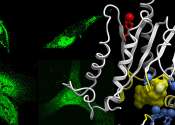Research team develops method to design safer opioids
Opioid medications offer people relief from debilitating pain, but these drugs come with dangers: the risk for addiction, miserable withdrawal symptoms and the potential for fatal overdose. In a study appearing in ACS Central ...









